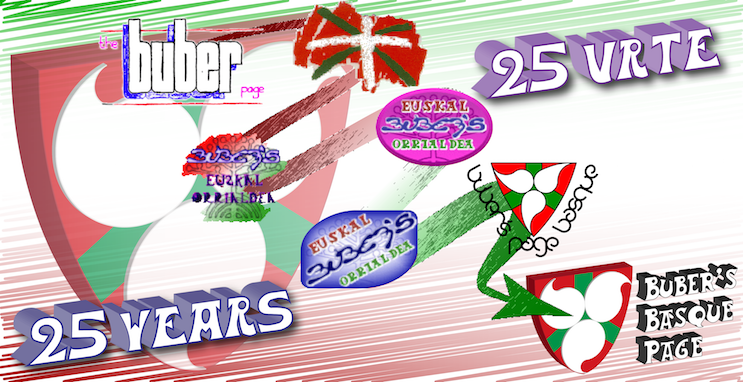Buber’s Basque Page is 25 years old! I first started working on what would become this site back in the fall of 1994. I had just started graduate school in the Physics Department at the University of Washington. I was very lucky to have a fellowship that freed me from teaching duties, so I used some of that extra time to learn HTML. That effort blossomed and flourished, becoming the site you see today. When I started, there was next-to-nothing in English about Basques on the internet and Buber’s Basque Page tried to fill that void, at least a little. Fortunately, the landscape is much richer today.

- The first bits of content were taken from notes I had from my time living in Donostia. I had tried to learn Euskara, spending a semester in intensive Basque language courses at the University of the Basque Country as part of the University Studies Abroad Consortium, but it was always easier to speak Spanish (even with my crappy Spanish) and hang out with Americans and speak English. I did learn some, but not nearly as much as I wish I had. But, I took lots of notes and some of that became some of the first content on this site, such as this word list and the declension and conjugation tables.
- Another critically important resource was the Basque-L mailing list. A collection of Basques scattered from all over the world, the discussion was usually pretty deep and pretty intense. But, there was a gold mine of information and, always with permission, I used some of that to build the early Buber’s Basque Page. For example, Maria Santisteban put together some Basque language lessons that I hosted on the site.
- As the site continued to grow, some parts became particularly popular and important. Probably the most popular was Xabier Ormaetxea’s Surname Research. People could send in questions about their Basque surnames and Xabier would look them up in the various references he had. Others would then post comments on each entry. Unfortunately, I had to disable the comments as it was an easy way for hackers to get into the site. Eventually, Xabier became busy with other efforts and, for a while, Susan Ybarra took over. But, with the advent of other genealogical sites, particularly the group basque-genealogy, where people can post queries about their names.
- Other popular items include Charles Shaffer’s list of Basque Restaurants, at the time one of the first comprehensive lists of Basque restaurants; chris’s translations of stories from Euskal Herriko Leiendak; interviews with people from the Basque world; the Guest Columns, particularly from the prolific David Cox; and the photo album of Basque tattoos. One part I’m very proud of is hosting an archive of the linguist Larry Trask’s website.
- One thing I quickly learned in building this site is that everything about the Basque Country is political. Anything you say about the Basques becomes a political football. Just saying that Nafarroa is part of the historical Basque Country brought out a lot of critiques, and I was just quoting a standard encyclopedia. The most controversy I ever encountered, however, was when the Spanish newspaper ABC tried to connect my nascent page to ETA.
- The two proudest moments I’ve had in running this page are when NABO recognized me and my site with a plaque of appreciation in 1998 and when I was recognized in 2006 with the Buber Sariak, an award for the best Basque websites, named after this site! That was truly an amazing honor! This site has opened a lot of new doors and opportunities for me and I’m extremely grateful.
- It has been a great 25 years. This site, dedicated to the memories of my dad Pedro Uberuaga Zabala and my grandpa Jose Maria Telleria, is a monument to all of the volunteers who have helped me collect, translate, and identify content that forms the heart of this site. But it couldn’t thrive as it has without the constant support of the readers and visitors. To everyone who has had a hand in helping create this site or has ever visited, Eskerrik Asko!
Discover more from Buber's Basque Page
Subscribe to get the latest posts sent to your email.


Congrats on your 25 years, Blas!
Coming from the Southern Calif world, where Basques and American Natives alike, were forced to lose their autonomy and assimilate into the Spanish-Mexican culture just to be able to get a job and survive; I grew up knowing nothing about my own people. I had only a great-grandmother left from the Old Country, and we didn’t speak the same language, so trying to draw info from her stubborn (and a little demented) memory, was, well, let’s just say I’d rather pull teeth from a mountain lion…. your site has opened doors I could not find on my own. Thank God for you and thank you from the bottom of my heart…. God Bless you always.
Hi Sissy. Thank you so much for the nice words and your support. I am very happy to hear that this site has helped you find out more about your ancestors. For me, this site helps me connect more to the land of my dad, to try to understand just a little bit more the world he came from. I hope that the same has happened for you.